
Giovanni Bellini Pietà 1474

Who will be the first in the world of finance to understand what’s going on AND be honest about it? It won’t be Roubini. Nothing has anything to do with recession or trade risks anymore. It’s the Fed and the Fed only. And there are no investors as long as the Fed monopolizes what were once markets. These so-called investors are in reality a bunch of rich socialists waiting for a central bank to hand them money. They’ll also be the first to warn about the dangers of socialism.
• Bipolar Markets in the “New Mediocre” (Roubini)
Financial markets tend to undergo manic-depressive cycles, and this has been especially true in recent years. During risk-ons, investors – driven by “animal spirits” – produce bull markets, frothiness, and sometimes outright bubbles; eventually, however, they overreact to some negative shock by becoming too pessimistic, shedding risk, and forcing a correction or bear market. Whereas prices of US and global equities rose sharply throughout 2017, markets began to wobble in 2018, and became fully depressed in the last quarter of the year. This risk-off reflected concerns about a global recession, Sino-American trade tensions, and the Federal Reserve’s signals that it would continue to raise interest rates and pursue quantitative tightening.
But since this past January, markets have rallied, so much so that some senior asset managers now foresee a market “melt-up” (the opposite of a meltdown), with equities continuing to rise sharply above their current elevated levels. One could argue that this latest risk-on cycle will continue for the rest of the year. For starters, growth is stabilizing in China, owing to another round of macroeconomic stimulus there, easing fears of a hard landing. And the United States and China may soon reach a deal to prevent the ongoing trade war from escalating further.
At the same time, US and global growth are expected to strengthen somewhat in the second half of the year, and the disruption of a “hard Brexit” has been averted, with the European Union extending the deadline for the United Kingdom’s departure to October 31, 2019. As for the eurozone’s prospects, much will depend on Germany, where growth could rebound as global headwinds fade. Moreover, central banks, particularly the Fed, have become super-dovish again, and this appears to have reversed the tightening of financial conditions that produced the risk-off in late 2018.

They are well on their way towards blowing up the entire US economy. Just like their counterparts in Japan, Europe, China. Will Russia be the last one standing?
• Fed Key Interest Rate Keeps Climbing, That Could Become A Problem (CNBC)
The Federal Reserve’s benchmark interest rate has inched up to its highest level in 11 years even though the central bank has sent a clear message that it is done tightening policy indefinitely. In recent days, the effective fed funds rate, which targets the overnight level that banks charge each other for loans, has moved up to 2.44%. That’s the highest since March 2008 and is just 6 basis points from the top of the target range and the closest to the top since December, when the Fed last raised rates. For now, the move is looked on as not being especially problematic given that there is still room between the current level and the top of the 2.25% to 2.5% range in which the rate is supposed to trade.
But moves toward the upper end of the band have prompted action before, and the trend likely will be a topic of discussion at next week’s Federal Open Market Committee meeting. When the Fed first began raising rates in December 2015, it succeeded in keeping the funds rate around the midpoint of the target range. But that has changed over the past year. “At 6 basis points from the top of the range, you’re still within the target. The question becomes whether they think technical pressure is driving this,” said Lou Crandall, chief economist at Wrightson ICAP and formerly of the New York Fed. “The only concern is whether you’ll have to make a technical adjustment in the future from preventing it from going higher.”
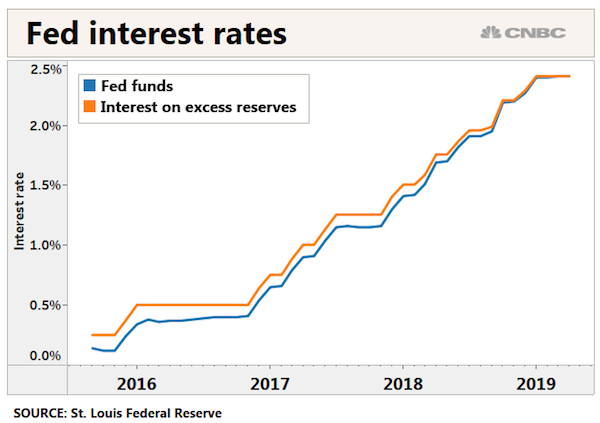

Fed to the rescue! Actually, as long as banks write new loans, the Fed can and will hold back.
• Cut the Price and They Will Come: US New Home Prices At Dec. 2014 Level (WS)
Home builders, the ultimate pros in the housing market, have figured out something after the malaise in the second half last year: Cut prices and buyers will come. The median selling price of new houses dropped 9.7% in March from March last year to $302,700, the Commerce Department reported this morning. This took the price back to about where it had first been in December 2014 ($301,500):
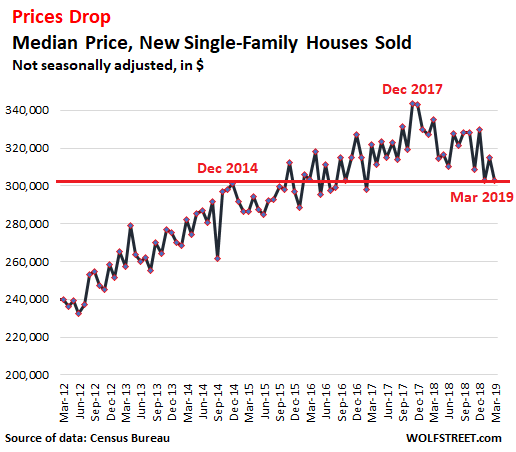
Homebuilders are motivated to move their speculative inventory. They’re making deals at lower prices, and they’re building homes at lower price points. And buyers responded. House sales at the lower end gained market share while houses at the higher end lost market share. Houses that were sold below $200,000 made up 16% of the mix in March, up from 11% in March 2018. Houses that were sold at prices of $400,000 or higher in March made up 29% of the mix, down from 32% in March 2018. This shift in the market, and the price cuts by homebuilders, has pushed the median new house price down 11.8% from the peak in December 2017. The year-over-year price drops starting in November last year were the sharpest such drops since Housing Bust 1:
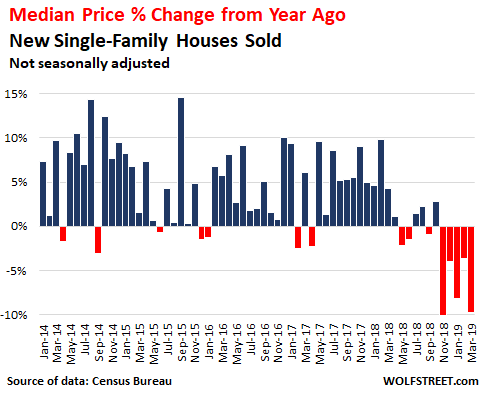
The new-house sales data, produced jointly by the Census Bureau and the Department of Housing and Urban Development, is volatile. It is revised in the following months, often quite drastically. But after a while, the trends become clear. For the long-term view: The median price of new houses ballooned by about 55% from the range in 2011 and 2012 to the peak in December 2017 ($343,300). This peak had exceeded by 31% the crazy peak of Housing Bubble 1 in March 2007. When it comes to price, the sky is not the limit:
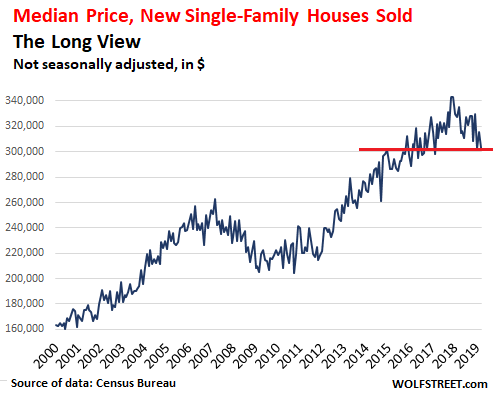

Give ’em a swap line.
• Chinese Banks Are Running Out Of Dollars (ZH)
Following the biggest quarterly credit injection in Chinese history, it is safe to say that China’s banks are flush with yuan loans. However, when it comes to dollar-denominated assets, it’s a different story entirely. As the WSJ points out, in the past few years, a funding problem has emerged for China’s biggest commercial banks, one which is largely outside of Beijing’s control: they’re running low on US dollars so critical to fund operations both domestically and abroad. As shown in the chart below, the combined dollar liabilities at China’s four biggest commercial banks exceeded their dollar assets at the end of 2018, a sharp reversal from just a few years ago.
Back in 2013, the four together had around $125 billion more dollar assets than liabilities, but now they owe more dollars to creditors and customers than are owed to them. The reversal is the result of just one bank: Bank of China, which for many years held more net assets in dollars than any other Chinese lender, ended 2018 owing $72 billion more in dollar liabilities than it booked in dollar assets. The other “top 3” lenders finished the year with more dollar assets than liabilities, even though their net dollar surplus has shrunk substantially in the past five years.
And yet, as everything else with China, there is more than meets the eye: as the WSJ reports looking at Bank of China’s annual report, the bank’s asset-liability imbalance is more than addressed by dollar funding that doesn’t sit on its balance sheet. Instruments like currency swaps and forwards are accounted for elsewhere. This is reminiscent of the shady operations discussed recently involving Turkey’s FX reserves, where the central bank has been borrowing dollar assets from local banks via off balance sheet swaps, which it then used to prop up and boost the lira at a time of aggressive selling of the local currency. It is safe to assume that the PBOC has been engaging in a similar operation.
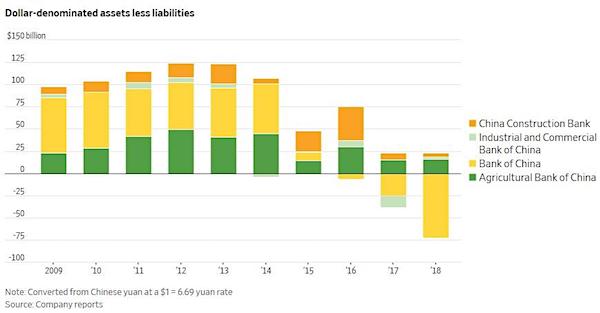

Hmmm. Hillary says: “You don’t put impeachment on the table as the only item on the table and say you’re going to get there no matter what.
But as I said yesterday, that is precisely what Nadler appears to do: “I do think, if proven – which hasn’t been proven yet – if proven, some of this would be impeachable, yes,” Nadler said..”
At best awfully close.
• Hillary Outlines “Roadmap” To Trump Impeachment (ZH)
Just hours after Nancy Pelosi attempted to mend the gaping division between the realists and the extremists in her party, failed presidential candidate Hillary Clinton decided to pile into the impeachment debate with her own take on the Mueller Report. “Well, I think what Nancy means, and I agree with what she means, is that it shouldn’t be a preordained conclusion, it shouldn’t be what you do for partisan, political purposes almost outside the framework of the Constitution,” she said during an appearance at the Time 100 Summit in New York. “You don’t put impeachment on the table as the only item on the table and say you’re going to get there no matter what, which is what happened in ’99. Instead, you say we are going to proceed with the seriousness that this demands.”
Dripping with irony, Clinton – whose husband was impeached by the House of Representatives in 1998 for perjury and obstruction of justice (only to be acquitted the following year by the Senate), and allegedly used her position to gain personal wealth through pay-to-play peddling of her and her husband’s influence – discuss the roadmap to President Trump’s impeachment and said he should have been indicted. “I have a kind of weird personal history about impeachment,” Clinton said to laughter from the audience. But, “not what you’re thinking,” she added, referring to her time as a staff attorney serving on the impeachment inquiry for former President Richard Nixon two decades earlier in 1974.
“I was one of the young lawyers who actually drafted the memo about what is a high crime and misdemeanor, and it was truly meant by our founders to describe actions that undermine the integrity of our government that placed the personal or political interest in a president over the interest of the nation,” she said.

It makes no difference where you stand on the issue(s), this is what you will have to deal with going forward. First off, the Horowitz report next month: “he intends to make criminal referrals as a result of his investigation.”
• The Conspiracy Against Trump (Giraldi)
Whether the Mueller report is definitive very much depends on the people they chose to interview and the questions they chose to ask, which is something that will no doubt be discussed for the next year if not longer. Beyond declaring that the Trump team did not collude with Russia, it cast little light on the possible Deep State role in attempting to vilify Trump and his associates. The investigation of that aspect of the 2016 campaign and the possible prosecutions of former senior government officials that might be a consequence of the investigation will likely be entertaining conspiracy theorists well into 2020. Since Russiagate has already been used and discarded the new inquiry might well be dubbed Trumpgate.
The media has scarcely reported how Michael Horowitz, the Inspector General of the Department of Justice (DOJ), has been looking into the activities of the principal promoters of the Russiagate fraud. Horowitz, whose report is expected in about a month, has already revealed that he intends to make criminal referrals as a result of his investigation. While the report will only cover malfeasance in the Department of Justice, which includes the FBI, the names of intelligence officers involved will no doubt also surface. It is expected that there will be charges leading to many prosecutions and one can hope for jail time for those individuals who corruptly betrayed their oath to the United States Constitution to pursue a political vendetta.
A review of what is already known about the plot against Trump is revealing and no doubt much more will be learned if and when investigators go through emails and phone records. The first phase of the illegal investigation of the Trump associates involved initiating wiretaps without any probable cause. This eventually involved six government intelligence and law enforcement agencies that formed a de facto task force headed by the CIA’s Director John Brennan. Also reportedly involved were the FBI’s James Comey, Director of National Intelligence James Clapper, Attorney General Loretta Lynch, Department of Homeland Security Director Jeh Johnson, and Admiral Michael Rogers who headed the National Security Agency.
Brennan was the key to the operation because the Foreign Intelligence Surveillance Act (FISA) court refused to approve several requests by the FBI to initiate taps on Trump associates and Trump Tower as there was no probable cause to do so but the British and other European intelligence services were legally able to intercept communications linked to American sources. Brennan was able to use his connections with those foreign intelligence agencies, primarily the British GCHQ, to make it look like the concerns about Trump were coming from friendly and allied countries and therefore had to be responded to as part of routine intelligence sharing. As a result, Paul Manafort, Carter Page, Donald Trump Jr., Jared Kushner and Gen. Michael Flynn were all wiretapped. And likely there were others. This all happened during the primaries and after Trump became the GOP nominee.

I don’t see any common ground here that could lead to a solution. The country’s split right down the middle.
• Theresa May Accuses Labour Of Dragging Its Heels In Brexit Talks (Ind.)
Theresa May has accused Labour of dragging its heels in the bid to find a cross-party compromise to deliver Brexit, even before the talks resumed after Easter. “The discussions with Labour have been serious but had also been difficult in some areas, such as in relation to the timetable for the negotiations,” the prime minister told her cabinet. No 10 fears Jeremy Corbyn does not share Ms May’s desire to avoid next month’s European parliament elections – which would require an agreement within days. The criticism is striking because it is the first time the government has turned on Labour since approaching the opposition three weeks ago.
Until now, it has been Mr Corbyn’s party that has blamed the prime minister for the lack of progress, accusing her of refusing to shift on her red lines – in particular, membership of a customs union. The cabinet discussion took place even before the talks resumed on Tuesday afternoon – but after a failure to hold any meaningful negotiations last week. Ms May’s spokesman told journalists: “The PM said the discussions with Labour had been serious, but had also been difficult in some areas, such as in relation to the timetable for the negotiations. “The PM said that the government’s position was that progress needed to be made urgently as it was vital to deliver on the result of the referendum and for the UK to leave the European Union as soon as possible.”
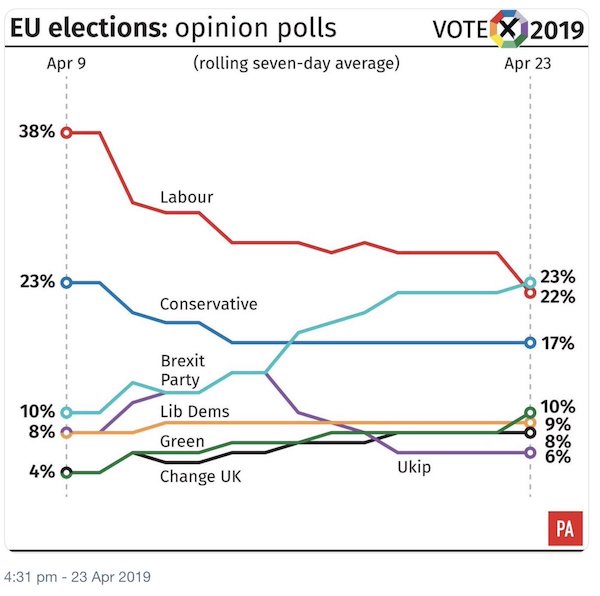

They knew that before agreeing to the talks.
• Labour Says Theresa May Unwilling To Offer Key Brexit Concessions (G.)
Labour has accused Theresa May of failing to offer any substantive changes to her Brexit deal in cross-party talks, as Downing Street’s hopes of a breakthrough in time to avoid taking part in European parliamentary elections waned. Brexit talks resumed on Tuesday between a team of ministers and shadow ministers. But Labour sources said the government team again appeared unwilling to countenance changes to the political declaration, which sets out the UK’s future relationship with the EU. Instead, ministers offered alternative ways of giving reassurance about the issues Labour has raised, such as on environmental standards and workers’ rights, including through redrafting the withdrawal act implementation bill (WAB) and tweaking separate planned government bills.
Downing Street continues to insist that it hopes to secure parliamentary ratification of a Brexit deal in time to avoid the UK having to participate in next month’s European parliament elections. The government has been considering tabling the WAB as a way of breaking the Brexit deadlock, but Labour has rejected the idea. “There’s a sequence; you have got to start with a different deal,” said a source. After the talks, Jeremy Corbyn blamed the government’s refusal to compromise on central issues such as membership of a customs union for the failure to make significant progress. “We’ll continue putting our case but quite honestly there’s got to be change in the government’s approach. They cannot keep on just regurgitating what has already been emphatically rejected three times by parliament, there’s got to be a change,” Corbyn said.

They should get Theresa May and Boris Johnson cancelled. Hypocrites.
• UK MPs Campaign To Have Donald Trump’s State Visit Cancelled (G.)
Theresa May has been criticised for allowing Donald Trump to make a state visit in June for D-day commemorations, with MPs orchestrating a campaign to stop the US president addressing parliament. Labour said it “beggars belief” that the government is offering the red-carpet treatment to Trump given his attacks on British and American values. Backbenchers began gathering signatures for a petition aiming to force the cancellation of the trip. The three-day trip starting on 3 June was confirmed by Buckingham Palace and the White House on Tuesday. The initial invitation was extended soon after Trump took office but a planned state visit in 2018, with all its pomp and ceremony, was downgraded to an official visit amid security concerns.
This time, Trump is likely to dine with the Queen, attend discussions with May in Downing Street and join an event in Portsmouth to mark the D-day landings. No 10 said the D-day event would be “one of the greatest British military spectacles in recent history” and would include a flypast of 26 types of RAF aircraft and at least 11 Royal Navy ships in the Solent. May said the visit would emphasise that the UK and US “have a deep and enduring partnership that is rooted in our common history and shared interests”. “We do more together than any two nations in the world and we are both safer and more prosperous because of our cooperation,” May said. “The state visit is an opportunity to strengthen our already close relationship in areas such as trade, investment, security and defence, and to discuss how we can build on these ties in the years ahead.”

Promises to be a good series. But who will pay attention?
• The Revelations of WikiLeaks: No. 1 (CN)
WikiLeaks was founded in 2006, but it was the April 5, 2010, publication of “Collateral Murder” that made the whistleblower-publisher a world-wide phenomenon, attracting admirers and enemies. WikiLeaks wrote of the film: “The video, shot from an Apache helicopter gun-sight, clearly shows the unprovoked slaying of a wounded Reuters employee and his rescuers. Two young children involved in the rescue were also seriously wounded.” WikiLeaks noted that Reuters had unsuccessfully attempted to gain access to the video through the Freedom of Information Act in the years after the strike. The day after the release of the footage, The New York Times described WikiLeaks as a once-fringe website that had moved into the big time.
“The site has become a thorn in the side of authorities in the United States and abroad,” it said. “With the Iraq attack video, the clearinghouse for sensitive documents is edging closer toward a form of investigative journalism and to advocacy.” Before 2010 WikiLeaks received a few high-profile journalism awards. But in the years since the publication of the video, it has received a slew of honors, including The Sam Adams Award for Integrity. On April 16, WikiLeaks announced a fresh award for its founder, Julian Assange, even as he remains isolated in a London prison. “Collateral Murder” was one of the most prominent releases sourced from then-Army intelligence analyst Chelsea Manning, who served seven years in a military prison as a result.
Manning, who had access to the video, having a Top Secret clearance, first offered the video to The New York Times and The Washington Post, which both turned her down. Manning then turned to WikiLeaks. Manning described the events that led up to her decision to submit the footage to the press in leaked audio of her testimony during her 2013 court-martial. She said Reuters’ inability to get the footage via a freedom-of-information request contributed to her decision to leak it. “The most alarming aspect of the video for me, was the seemingly delight of bloodlust they [the pilots] appeared to have. They dehumanized the individuals they were engaging with, and seemed to not value human life in referring to them as ‘dead bastards,’ and congratulating each other on the ability to kill in large numbers.”
Marjorie Cohn, a legal analyst, is one of those who has described the contents of the footage as evidence of U.S. war crimes. As such she argues that Manning was legally obligated to expose such information. In a 2013 column for Truthout, she cites the Geneva Conventions, the Army Field Manual and the Uniform Code of Military Justice as all setting forth the duty of a service member to disobey unlawful orders. None of the pilots, military officials nor policy-makers have ever been charged or otherwise held responsible for the events shown in the video.
The Sydney Morning Herald: Julian Assange wins EU journalism award established in honour of an assassinated journalist.https://t.co/FlA6DpNzc9? pic.twitter.com/y0pda8pgwR
— WikiLeaks (@wikileaks) April 16, 2019










